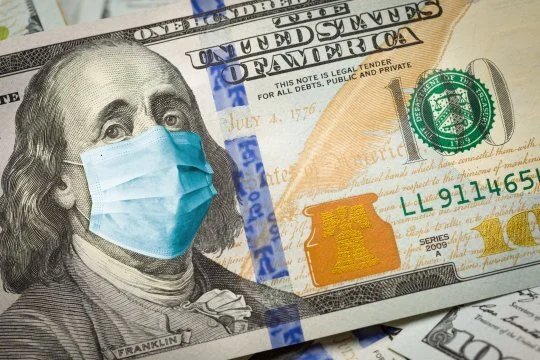Lessons after the Lockdown: Public Health, Economics, and the Common Good
Tuesday, June 2, 2020
6:00PM EDT
Registration required
Join us at 6:00PM EDT (5:00PM CDT) on Tuesday, June 2nd as we cosponsor, together with the Lumen Christi Institute, a webinar on “Lessons after the Lockdown: Public Health, Economics, and the Common Good.” In this timely panel discussion moderated by Joseph Capizzi (Ethicist), Kirk Doran (Economist), Fr. Paul McNelis, SJ (Economist), Daniel Sulmasey (MD/PHD Medical Ethicist), and Mary Hirschfeld (Theologian and trained Economist) will discuss lessons learned in the pandemic. The Saint Benedict Institute is a cosponsor of this event.
This event is free and open to the public, but online registration is required. For more information and to register for this webinar, click here.
After two months of lockdown, nations across Europe and parts of the US are relaxing restrictions and facing new challenges. Where do we stand economically and socially? How might we have better protected the medically and economically vulnerable? How should we view the lockdown with its costs and benefits ethically? A previous event cosponsored with the Lumen Christi Instititute on "The Economic Costs of the Pandemic: Catholic Social Teaching and Economics in Dialogue,” provoked lively reactions. This event will consider what the principles of the common good, human dignity, justice, and solidarity mean in our present circumstances and how they ought to inform our prudential judgement going forward. Join as a panel of economists, theologians, and ethicists discuss lessons learned in the pandemic.
Joseph E. Capizzi (Moderator) is Ordinary Professor of Moral Theology at the Catholic University of America. He teaches in the areas of social and political theology, with special interests in issues in peace and war, citizenship, political authority, and Augustinian theology. He has written, lectured, and published widely on just war theory, bioethics, the history of moral theology, and political liberalism. Dr. Capizzi is the Executive Director of the Institute for Human Ecology at the Catholic University of America. He received his B.A. from the University of Virginia, a Masters in Theological Studies from Emory University, and both an M.A. and Ph.D. in Theology from the University of Notre Dame. He lives in Maryland with his wife and six children.
Kirk Doran (Panelist) is the Henkels Family Collegiate Chair and Associate Professor of Economics at the University of Notre Dame. Doran received his B.A. in Physics from Harvard University in 2002, his S.M. in Applied Mathematics from Harvard University in 2002, and his Ph.D. in Economics from Princeton University in 2008, where his dissertation won Princeton's labor economics dissertation award. Doran's research focuses on issues in labor economics, innovation economics, and international migration, with a particular focus on human capital complementarities. Professor Doran's research has been published in the Quarterly Journal of Economics, the Review of Economics and Statistics, the Journal of Labor Economics, the Journal of Human Resources, Economica, Economics Letters, and Innovation Policy and the Economy, and has been funded by the Alfred P. Sloan Foundation, the Upjohn Institute, and the Kauffman Foundation.
Mary Hirschfeld (Panelist) is Associate Professor of Economics and Theology at Villanova University. Dr. Hirschfeld holds a Ph.D. in Economics from Harvard and a Ph.D. in Theology from the University of Notre Dame. She works at the boundary between both disciplines, specifically by developing an approach to economics that is grounded in the thought of Saint Thomas Aquinas, with applications to questions of consumption economics, economic justice, the common good, the nature of practical reason, and economic methodology. She is the author of Aquinas and the Market: Toward a Humane Economy (Harvard, 2018) and her writings on economics have been published in the Review of Economics and Statistics, the Journal of Economic Education, and History of Political Economy.
Paul McNelis (Panelist) holds the Robert Bendheim Chair in Economic and Financial Policy at the Gabelli School of Business at Fordham University. Prior to this appointment, he was in the Economics department at Georgetown University from 1977 to 2005. He received his Ph.D. in Economics from Johns Hopkins University in 1974. His writings are in the field of computational macroeconomics, concentrating on problems of adjustment and financial liberalization in Latin America and Asia. His current research is on applications of neural networks and genetic algorithms for predicting exchange-rate and asset-price instabilities, for assessing the effects of alternative monetary aggregates on inflation and interest rates in the short run, for evaluating credit risks in emerging markets, and for solving real business-cycle models. Professor McNelis is a member of the Society of Jesus and was ordained a Catholic priest in 1977 after completing studies in Theology at the Boston College School of Theology and Ministry.
Daniel Sulmasy (Panelist) is Acting Director of the Kennedy Institute of Ethics and the inaugural Andre Hellegers Professor of Biomedical Ethics at Georgetown University. He holds a Ph.D. from Georgetown University and an M.D. from Cornell University. His research interests encompass both theoretical and empirical investigations of the ethics of end-of-life decision-making, ethics education, and spirituality in medicine. He has done extensive work on the role of intention in medical action, especially as it relates to the rule of double effect and the distinction between killing and allowing to die. He is also interested in the philosophy of medicine and the logic of diagnostic and therapeutic reasoning. Dr. Sulmasy is the author or editor of six books: The Healer's Calling (1997), Methods in Medical Ethics (2001; 2nd ed. 2010), The Rebirth of the Clinic (2006), A Balm for Gilead (2006), Safe Passage: A Global Spiritual Sourcebook for Care at the End of Life (2013), and Francis the Leper: Faith, Medicine, Theology, and Science (2014). He also serves as editor-in-chief of the journal Theoretical Medicine and Bioethics.


